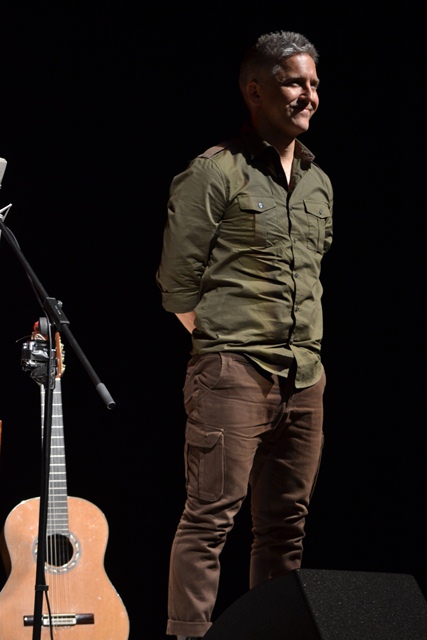The son of Horacio Buscaglia (a key musician in the development of popular music in Uruguay), Martín Buscaglia stands as one of the most peripatetic performers in Uruguay. He has played with international artists such as Arnaldo Antunes, Kiko Veneno and Julieta Venegas, and his Uruguayan peers include Rubén Rada, Jaime Roos and Jorge Drexler.
After refusing to issue a live CD for a long time, a series of events led to the release of “Somos Libres” [We Are Free] last year – a live recording that summarized his career, both with grace and finesse. It included covers from artists as diverse as Jonathan Richman and Mandrake Wolf, and texts penned by his father and compiled by Buscaglia himself and the poet Macachin, on a book titled “Mojos”.
As arises from the conversation we had in his house/studio, what held “Somos Libres” together was the fact the album was not conceived as a live recording, but as a voice/guitar concert – a format Buscaglia has rarely favoured throughout his career. And the very essence of the CD was determined by the fact it was recorded without premeditation. The decision to release the full performance was taken later.
The following exchange took place a couple of days before Martín presented “Somos Libres” at Periscopio (a new, alternative venue that seats about 120 people) and two weeks after he had presented it at the prestigious Solís Theatre in Montevideo. You can read the original post in Spanish (as published on Cooltivarte.com) here.
Your antipathy towards live albums became publicly known when you started promoting “Somos Libres”. How far does it really go?
I can count the live albums I actually like on one hand. If you asked me about studio albums, I could easily name a hundred. But when it comes to live records, they are far and few between. There’s one by Sam Cooke that I’m really fond of – he was an old school soulman, a bit of a father figure to Otis Redding and all these soul singer that were extremely moving. And the album I’m talking about is one that was recorded in Miami – a place you would never deem as very delicate. And that’s a record you can’t stop listening to once it’s spinning, you can’t listen to just one or two numbers. And you end up thinking that a lot of children were procreated that night! [Laughs]
And then, there’s this live album by Roberto Carlos that I discovered one day I was flying by plane. I found it using the flight’s thematic selector, it was a show recorded for the MTV Unplugged series. I chose “Brazilian Music”, and this very crystalline and delicate sound came through. And since it was a MTV unplugged show, it was freed from that kitsch aura that most of Roberto Carlos’ recordings have. The guitars were acoustic, and his voice sounded really divine. That was an album I listened to a lot, and which I also recommended and gave away more than often.
But I’m not very keen on live albums. When the DVD with The Bochamakers was ready, they asked me “Don’t you want to release the audio as a separate CD as well ?”. And I refused, because you might sound superb, but there’s something missing on a live CD.
There’s an image on your blog that I think says as much… it’s the one showing a sign which reads “These things we stare at, also stare back at us”. I think that’s the problem with live records – the context that permeates and (eventually) completes the event with its presence is missing.
Exactly, that’s the one element which is missing. And it’s something pivotal that in no way can be apprehended. It depends on so many factors, and not even having all of these under control means you will be able to set it down on tape. It’s something magical. That’s why there’s so many concerts that work wonderfully even though the technical aspects are not immaculate. And there are immaculate concerts in which that magic is sorely missing.
Summing up, then, what an artist experiences live with the audience is what turns a live show into an epiphany.
Yes, any religious ritual is made complete by the others. And in some cases (like music when we place it in such a plane), it becomes very specific. There are others which are more intimate by definition, like reading a book. In that case, it’s just you reading a book in the way you like best. But as far as music is concerned, there’s something more clearly defined between those who give and those who receive. We are talking about a specific night, with a specific ambience and illumination. And it all comes together into a singular thing which is lost on an audio CD. Continue reading

